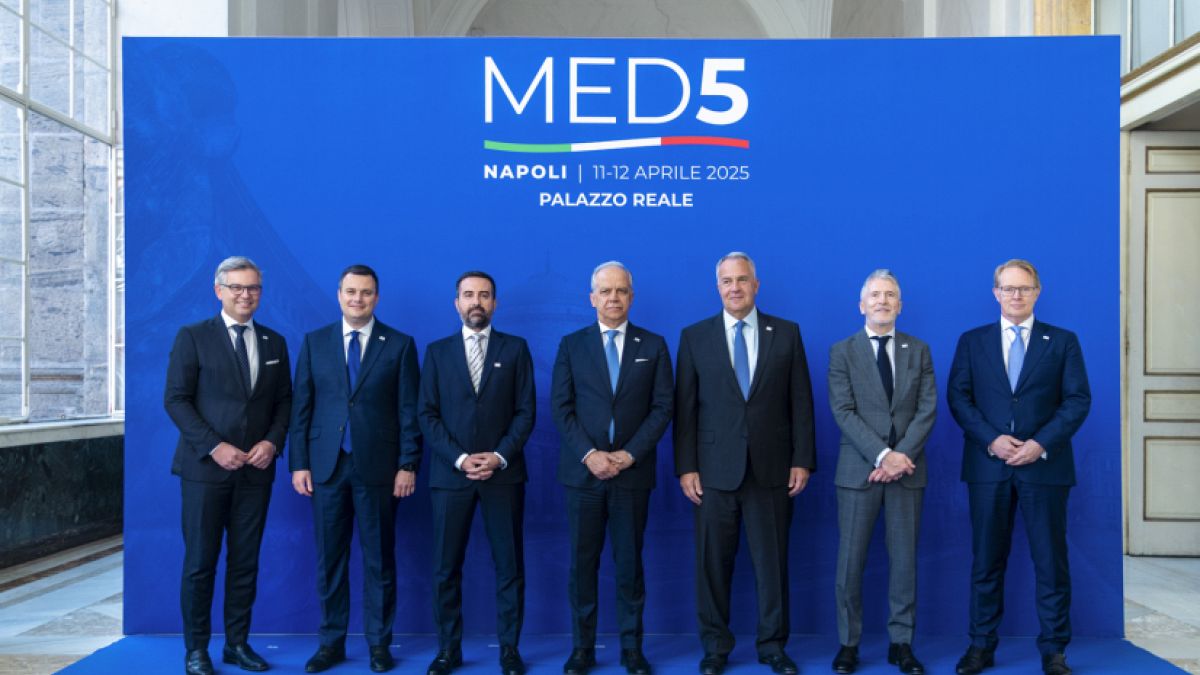The Med5, a two-day meeting of the interior ministers of the five European countries bordering the Mediterranean Sea, ended in the Royal Palace in Naples.
Italy, Spain, Greece, Cyprus and Malta were represented, as well as the European Commissioner for Home Affairs and Migration Magnus Brunner and Frontex Executive Director Hans Leijtens.
At the end of the summit, the ministers signed a joint declaration.
Piantedosi: migrants sent to Albania considered ‘dangerous’
“We all recognised the need to strengthen Frontex,” said Italian Interior Minister Matteo Piantedosi during the press conference at the end of the summit, reiterating that “the fight against human traffickers is always a priority”.
“It is also our intention to work on assisted voluntary returns, a measure that we consider crucial, especially if it is supported by concrete actions to help returnees with their economic and social reintegration in their countries of origin,” Piantedosi added.
According to the minister, it is a priority for the European Union to maintain an adequate level of funding and to “launch a specific initiative on assisted voluntary returns as soon as possible, in order to take a qualitative leap forward and outline a real common strategy.”
Responding to a question from journalists on the transfer of irregular migrants to Albania, the minister claimed that these were individuals considered to be dangerous. “Out of the 40 people transported to Albania, there are as many as five cases of convictions for sexual violence, one case of attempted murder, they had previous convictions for weapons, property crimes, theft, resisting a public official, personal injuries,” Piantedosi said.
“There is a large sample of precedents, which allows us to identify the characterisation of people judged to be dangerous and, as such, subject to detention, as provided for by our law,” he added, explaining the reason for handcuffing the immigrants while they disembarked from the ship that arrived in Albania on Friday.
“Among the reasons for which these containment measures are put in place is to protect the safety of police officers as well, which as far as I am concerned always remains in first place.
Strengthening Frontex and more funding to combat illegal immigration
Ministers Matteo Piantedosi (Italy), Nicholas A. Joannides (Deputy Minister Cyprus), Makis Voridis (Greece), Byron Camilleri (Malta) and Fernando Grande-Marlaska Gómez (Spain) reaffirmed in their joint declaration their commitment to develop a common political vision on the most relevant issues of the European migration agenda.
They also reaffirmed the importance of the European Pact on Migration and Asylum and committed themselves to its effective implementation, while also calling for immediate and unconditional funding based on needs to support the necessary fulfilment of the Pact’s obligations within the current multiannual financial framework.
At the same time, they demanded increased allocations for the internal and external dimensions of asylum, migration and border management within the next MFF, in line with the increasingly heavy burdens on frontline Member States and in consideration of the fact that external borders are managed by them for the good of the whole Union.
Emphasis on human rights
The focus of Member States and European institutions, according to the Med5 ministers, must remain on exploring appropriate innovative solutions to address irregular migration, including new ways to prevent and counter irregular migration, manage asylum and return, in line with EU and international law and ensuring sustainable solutions.
“We emphasise that an effective return policy is vital for a well-functioning asylum system and therefore indispensable for the integrity of the European Pact on Migration and Asylum,” they said while welcoming the European Commission’s efforts to increase the efficiency of the return process by providing member states with common standards for effective return management.
“We also call on the European Commission to launch, in the framework of the Global Alliance against Smuggling of Migrants, a specific initiative on assisted voluntary returns from third countries of transit to migrants’ countries of origin, including the organisation of an international conference,” the ministers added, reiterating that conditions must be created for communities and individuals to live in safety and dignity in their countries.
“The respect of human rights is the most important pillar for us because the respect of these rights is a cornerstone of the values of the European Union,” said Spanish minister Grande-Marlaska.
Regarding the migrant centres in Albania, he explained that it is necessary to know what the European institutions think.

